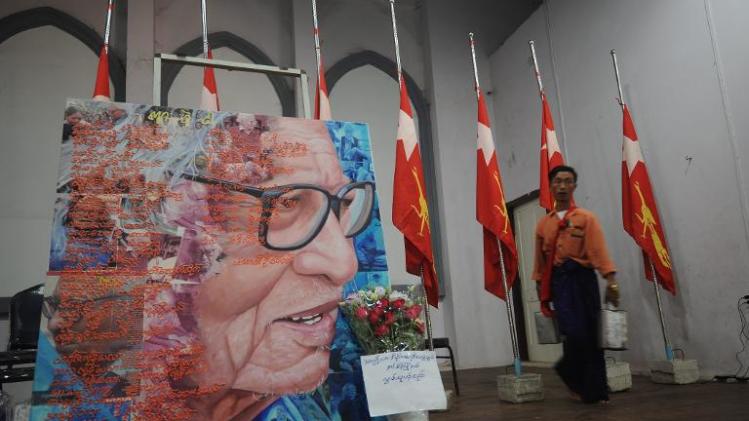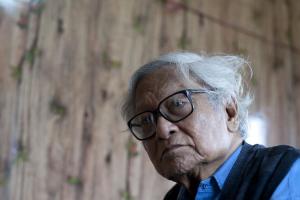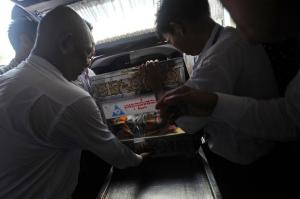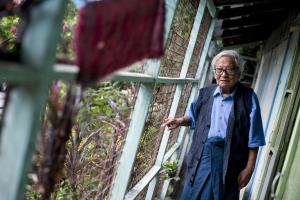Yangon (AFP) - Win Tin, one of the founders of Myanmar's
pro-democracy opposition and the nation's longest-serving political
prisoner, died Monday at the age of 84 after battling for decades to
bring freedom to a nation that suffered under military rule.
The former journalist and veteran campaigner, whose
almost two decades in jail failed to dull his commitment to the
democratic cause, had suffered worsening ill health in recent weeks.
He died in hospital in Yangon early Monday, National League for Democracy party spokesman Nyan Win told AFP. A funeral service will be held on Wednesday.
A towering figure within the democracy movement, Win Tin formed the NLD with Aung San Suu Kyi in 1988 in the wake of a student-led pro-democracy uprising. He was imprisoned the following year for his political activities.
He reiterated his support for party leader Suu Kyi in the days before he died, according to his long-time assistant Yar Zar.
"We are so sad to have lost him -- it is like the world has been lost," he told AFP.
"But we have many things to do. We will continue as he asked and will follow his way to democracy," Yar Zar added.
Myanmar began its emergence from nearly half a century of military rule in 2011, under a quasi-civilian government that has won international plaudits for reforms including the release of hundreds of political prisoners.
Suu Kyi, who was freed from years of house arrest in 2010, has also been welcomed into parliament at the helm of her party and has indicated her wish to become president after 2015 elections.
But the army retains a tight grip on the fledgling parliament, casting doubt over Suu Kyi's chances for the top job, and campaigners stress there is still a long way to go before the country can enjoy full democracy.
- Voice of dissent -
Bespectacled and with a shock of white hair, Win Tin possessed an urbane temperament that belied his steely nature.
He died in hospital in Yangon early Monday, National League for Democracy party spokesman Nyan Win told AFP. A funeral service will be held on Wednesday.
A towering figure within the democracy movement, Win Tin formed the NLD with Aung San Suu Kyi in 1988 in the wake of a student-led pro-democracy uprising. He was imprisoned the following year for his political activities.
He reiterated his support for party leader Suu Kyi in the days before he died, according to his long-time assistant Yar Zar.
"We are so sad to have lost him -- it is like the world has been lost," he told AFP.
"But we have many things to do. We will continue as he asked and will follow his way to democracy," Yar Zar added.
Myanmar began its emergence from nearly half a century of military rule in 2011, under a quasi-civilian government that has won international plaudits for reforms including the release of hundreds of political prisoners.
Suu Kyi, who was freed from years of house arrest in 2010, has also been welcomed into parliament at the helm of her party and has indicated her wish to become president after 2015 elections.
But the army retains a tight grip on the fledgling parliament, casting doubt over Suu Kyi's chances for the top job, and campaigners stress there is still a long way to go before the country can enjoy full democracy.
- Voice of dissent -
Bespectacled and with a shock of white hair, Win Tin possessed an urbane temperament that belied his steely nature.
He
was unwavering in his loyalty to Suu Kyi, but was at pains to remind
the NLD of its role as an opposition party when its leader took her seat
in parliament alongside her former captors.
And he was unafraid to
voice disagreement with the Nobel laureate -- a rare attribute in a
party where many are awed by "the Lady".
Win Tin's death was met with profound sadness within the democracy movement.
"We
have lost something precious forever," said NLD MP Khin San Hlaing who
had gathered with dozens of mourners for a memorial service at a Yangon
church.
- Political prisoner -
During his imprisonment he was interrogated for up to five days at a time, deprived of sleep, hooded and beaten.
From 1996 he was also kept in solitary confinement and allowed only fleeting 15-minute visits from family every two weeks.
He walked out of jail still wearing his blue prison uniform because he did not believe he would really be freed.
Last
year, he tangled with authorities who demanded the return of the blue
shirt and sarong-like longyi he had worn in prison, refusing to repay
the cost of the clothing -- around $2.
He
told AFP that he continued to wear a blue shirt in solidarity with
dissidents still in jail and to show the world that his country was not
yet truly free.
Myanmar's junta once held about 2,000 dissidents.
The
government of President Thein Sein, a former general-turned-reformer,
claimed it had freed them all by the end of last year.
Win
Tin began his career as a journalist at the Agence France-Presse bureau
in Yangon in the early 1950s soon after Myanmar's independence from
British colonial rule.
After three years with AFP he moved to the Netherlands, where he spent another three years.
In 1962, General Ne Win seized power in a coup, plunging the country into tyranny.
"The
reason I became a politician is because of military governments. They
put pressure on us. They seized the newspapers and publishing houses. As
I have many contacts in politics, I reached into politics," Win Tin
told AFP last year.






Comments